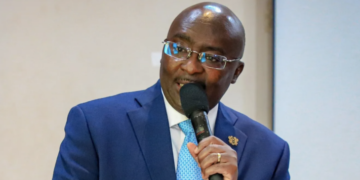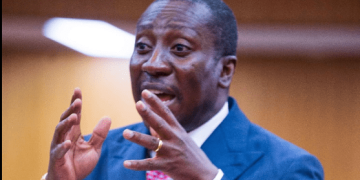Minister of National Security, Mr Albert Kan-Dapaah, has called for collaborative efforts by State and non-State actors to address the widespread twin threat of terrorism and violent extremism.
“The threat landscape has consistently changed. The security requirements of our citizenry keep changing. The geo-strategic dynamics, with direct influence on State survival, keep undergoing mutations without warning,” he said.
Mr Kan-Dapaah said the security threats underscored the relevance of dialogue and multi-stakeholder engagement not only at national levels but also at regional levels, towards finding lasting solutions to the common security threats of West African States.
The Minister was speaking at a two-day Non-State Actor’s Conference on the Accra Initiative, which was established in September 2017 as a mechanism to enhance intelligence and security cooperation between the Intelligence and Security Agencies of Member States.
It was formed to address the deteriorating security situation in the Sahel region and curb the southward drift of the threat of terrorism to coastal West African States.
The Initiative, since its operationalisation, has achieved various milestones key among which is the successful execution of joint operations along the common borders of Member States leading to the disruption of terrorist cells.
He said the Sahel and the entire West African region are going through a difficult moment due to the ongoing rapid spread of terrorism and violent extremism.
He said the prominence given the threat of terrorism and violent extremism did not underplay other prevailing security threats, such as cross-border crimes among others, which remain key impediments to regional security and development.
“Quite frankly, we continue to shine the spotlight on the threat of terrorism and violent extremism in view of the fact that these threats, and the attendant ramifications have manifested with greater intensity and speed than anticipated decades ago.
Data from the latest Global Terrorism Index points to the Sahel and West African regions as epicentres of terrorism and violent extremism, with four countries in the region featuring in the top ten countries in the world as the most impacted by terrorism.
In the first quarter of 2022, 346 terrorist attacks were recorded in Africa, 49 per cent of which occurred in West Africa.
Also, between 1st July and 30th September 2022 alone, 264 terrorist attacks, resulting in 745 fatalities and 239 injuries, were recorded in West Africa.
Mr Kan-Dapaah said the objectives of the Accra Initiative were in line with the counter-terrorism framework of both the African Union and ECOWAS.
“To that end, the Accra Initiative is considered critical to countering terrorism in littoral West African States while contributing to the overall West African solution to fighting terrorism and violent extremism and preventing the spread of same within the sub-region.
He called for innovative approaches to address prevailing regional security threats.
The EU Ambassador to Ghana, Irchad Razaaly, pledged continuous support for Ghana and the countries in the sub-region to deal with the threats of terrorism and extremism.
Mr Benedict DERE, Executive Secretary, Accra Initiative said given the evolving security situation and challenges, the Member States of the Accra Initiative deemed it necessary to mobilise all state and non-state actors as well as the various relevant partners to create a synergy of actions around the objective of combating terrorism and violent extremism in the area.
The two-day meeting of experts would deliberate on current security challenges facing West African countries, credible, preventive and coordinated response and building a partnership with border communities to defeat violent extremism, terrorism and transnational organised crime.
Other areas to be considered are challenges and opportunities of transhumance: in the context of countering violent extremism, terrorism and transnational organised crime;
The outcome of the experts meeting would be discussed at a ministerial session to be held on 21 November 2022, which will be attended by the Ministers of Security/Interior, Defence and Foreign Affairs of the Accra Initiative Member countries, including Nigeria, the Foreign Ministers of the EU countries and their Ambassadors in Ghana, the Foreign Ministers of some non-EU countries (strategic partners) and their Ambassadors in Ghana.
On 22 November 2022, a Summit of Heads of State and Government will adopt resolutions to enable the Accra Initiative to effectively accelerate the implementation of its objectives.



















































































